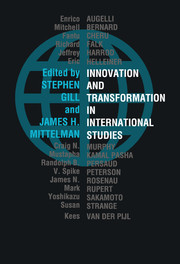Book contents
- Frontmatter
- Contents
- List of contributors
- Preface
- Acknowledgements
- Part I Rethinking and remaking the roots of global social and political theory
- Part II Political economy: the social and ecological anatomy of transformation
- 5 Ecology, political economy and the counter-movement: Karl Polanyi and the second great transformation
- 6 Braudelian reflections on economic globalisation: the historian as pioneer
- 7 Social forces and international political economy: joining the two IRs
- 8 Transnational class formation and state forms
- Part III Transformation, innovation and emancipation in global political and civil society
- Part IV Reflections on global order in the twenty-first century
- References
- Index of names
- Index of subjects
5 - Ecology, political economy and the counter-movement: Karl Polanyi and the second great transformation
Published online by Cambridge University Press: 05 July 2011
- Frontmatter
- Contents
- List of contributors
- Preface
- Acknowledgements
- Part I Rethinking and remaking the roots of global social and political theory
- Part II Political economy: the social and ecological anatomy of transformation
- 5 Ecology, political economy and the counter-movement: Karl Polanyi and the second great transformation
- 6 Braudelian reflections on economic globalisation: the historian as pioneer
- 7 Social forces and international political economy: joining the two IRs
- 8 Transnational class formation and state forms
- Part III Transformation, innovation and emancipation in global political and civil society
- Part IV Reflections on global order in the twenty-first century
- References
- Index of names
- Index of subjects
Summary
This chapter examines the contribution of Karl Polanyi to a critical theory of ecological political economy. It is argued that whilst Polanyi's work contains significant ambiguities over questions of political agency – for example, his arguments sometimes seem to invoke a form of technological determinism – other aspects of his writing contain theoretical innovations that enable a richer and deeper understanding of the limits and contradictions of political economy and ecology in the socalled age of globalisation.
My objective here is to examine the possibilities of integrating these two interrelated aspects of global transformation through the perspective of Karl Polanyi. Polanyi's work has been of interest to a number of international political economists who see parallels between globalisation and his analysis of nineteenth-century capitalism. Polanyi's framework has also inspired political ecologists who have seized upon his critique of how industrial society began to understand nature in economic categories and subordinated the surface of the planet to the needs of accumulation (Rogers, 1994; Worster, 1993; Eckersley, 1992; Henderson, 1991).
The remainder of this chapter will seek to make explicit the method and purpose to which Polanyian ideas could contribute. It will focus on three particular concepts in Polanyi's analysis that may serve to link global political economy and ecology; those of ‘embeddedness’ and ‘disembedding’, ‘fictitious commodities’ and the ‘counter-movement’. It will discuss them in the context of some of Polanyi's larger themes, as well as identify the strengths and limitations of these ideas for the study of world order.
- Type
- Chapter
- Information
- Innovation and Transformation in International Studies , pp. 75 - 89Publisher: Cambridge University PressPrint publication year: 1997
- 18
- Cited by



